Are you planning to catch your first wave but need help determining where to begin? Look no further! This guide unveils the best beginner surf spots around the globe, catering to aspiring surfers seeking gentle waves, knowledgeable instructors, and stunning backdrops.
From the golden sands of Costa Rica to the charming shores of Portugal, we explore hidden gems and renowned beaches, ensuring your surfing journey starts on the right foot. So grab your board, pack your sunscreen, and prepare to discover the perfect destination to launch your surfing adventure!
1. Cowell’s Beach, Santa Cruz
Carving a path through the Pacific, your longboard glides effortlessly, anticipating building with each dip and rise. The sun warms your back as you paddle out, energized by the vibrant scene at Cowell’s Beach, one of Santa Cruz’s best beginner surf spots. Let’s explore what awaits you in one of these beginner surf spots Santa Cruz.
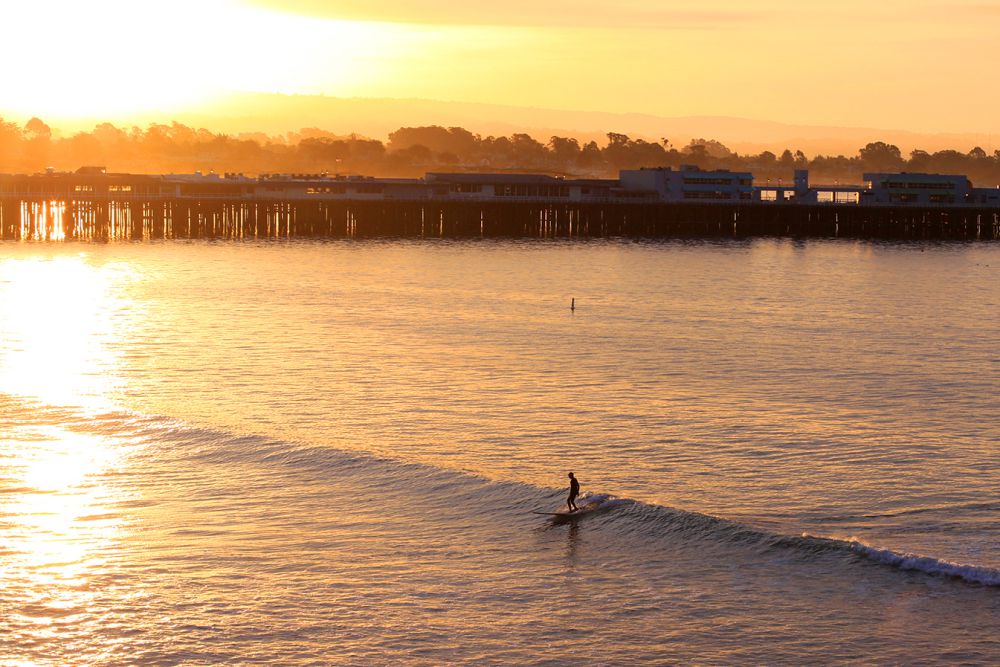
- Water: Protected cove with gentle waves, ideal for learning.
- Swell & Wind: Consistent groundswells, typically moderate, with offshore winds creating clean and predictable rides.
- Water Temperature: Ranges from 55°F (13°C) in winter to 65°F (18°C) in summer, requiring a wetsuit year-round.
- Air Temperature: Mild throughout the year, averaging 55°F (13°C) in winter and 70°F (21°C) in summer.
- Wave Size: Typically knee- to waist-high, offering ample time for maneuvering and catching waves.
- Crowd Levels: Moderately crowded, especially on weekends and during peak season (summer).
- Best Time to Surf: Early mornings or weekdays offer less congestion. Fall and spring provide consistent swells with comfortable water temperatures.
- Skills: This is one of the best beginner surf spots Santa Cruz, but also suitable for novice surfers. Experienced instructors are readily available for lessons and guidance.
With its gentle waves, approachable atmosphere, and convenient location, Cowell’s Beach deserves its reputation as a premier destination for surfing novices.
2. Kuta Beach, Bali
For many, the name “Bali” conjures images of turquoise waters, swaying palm trees, and exhilarating waves. Kuta Beach, located on the island’s south coast, embodies this quintessential image and serves as a popular entry point for those seeking to experience surfing in Bali for beginners.
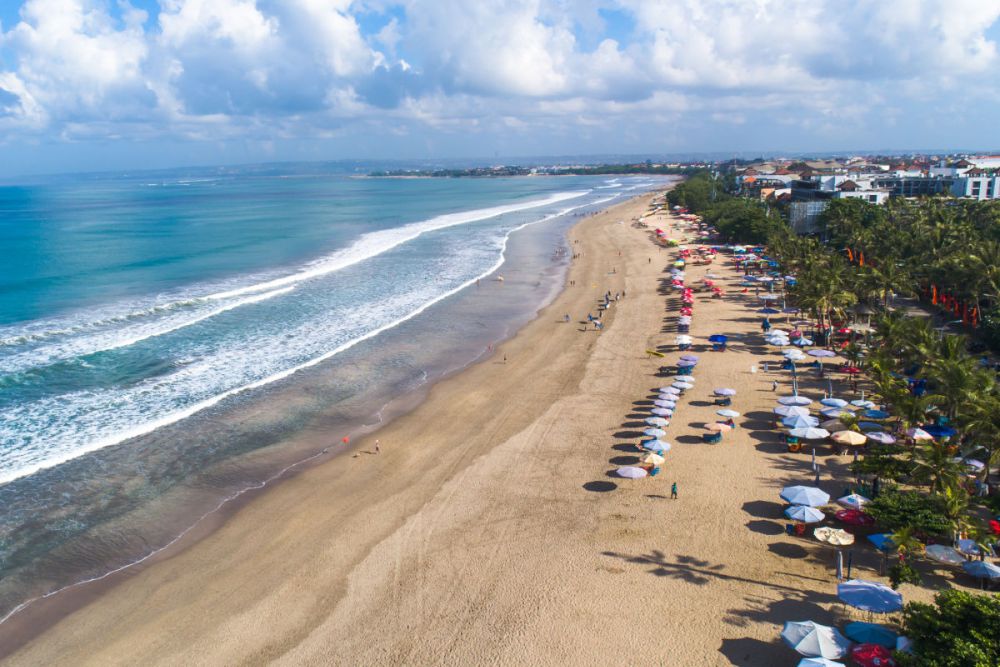
While not the only option, Kuta Beach offers a combination of manageable wave conditions, experienced instructors, and vibrant surroundings, making it a worthy contender for your Bali beginner surfing spots shortlist.
- Water Type: Indian ocean, Sandy beach break
- Swell & Wind: Consistent southwest swell, offshore winds during the dry season (May-Sept)
- Water Temperature: Warm (26-28°C)
- Air Temperature: Tropical (28-32°C)
- Average Wave Size: 1-2 meters
- Crowd Levels: High, especially during peak season (June-Aug)
- Best Time to Surf: Mornings during low tide, dry season for consistent waves
- Skills: Beginner-friendly, ideal for learning pop-ups, paddling, and basic wave riding
While Kuta offers a gentle introduction to surfing, exploring other Bali beginner surfing spots like Jimbaran or Canggu might provide a less crowded and more personalized experience.
3. Lahaina Beach, Maui, Hawaii
While Maui boasts world-class breaks for seasoned surfers, Lahaina Beach offers a gentle introduction to the sport, making it a prime spot for surfing in Maui for beginners. Calm waters, consistent swells, and a supportive community create an ideal learning environment.
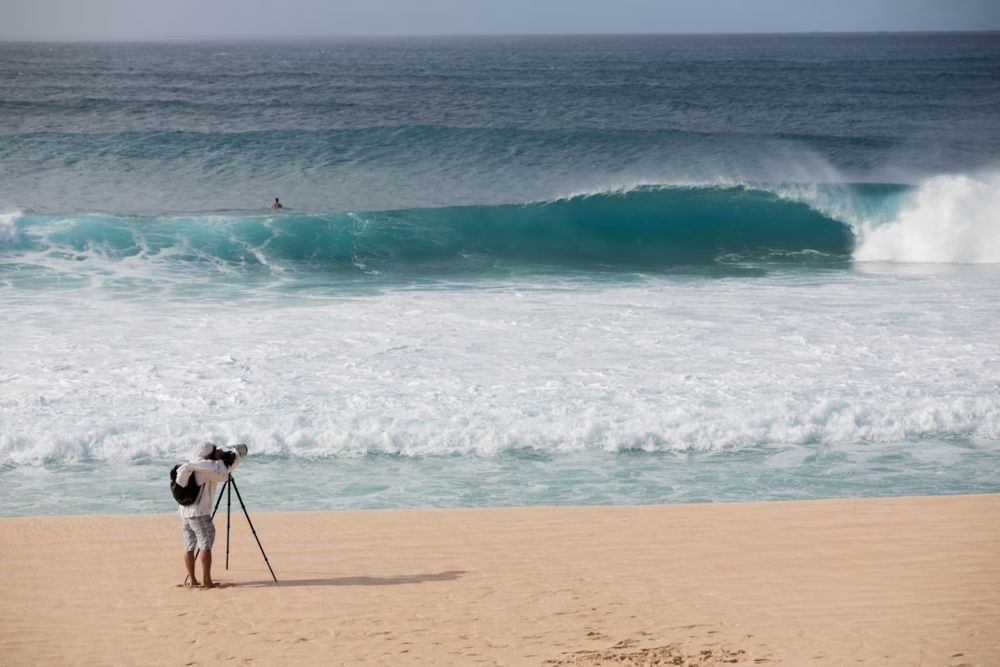
- Water type: Protected cove with sand bottom and occasional reef patches.
- Swell & Wind: Swells are typically small to medium (2-6 feet), with dominant south and southwest directions. Trade winds create offshore conditions most mornings.
- Water Temperature: Averages a comfortable 77°F year-round.
- Air Temperature: Warm and sunny, averaging 82°F.
- Wave Size: Ideal for learning, averaging 2-4 feet with occasional sets reaching 5-6 feet.
- Crowd Levels: Moderate, especially on weekends and during peak season.
- Best Season to Surf: Summer (May-September) offers the calmest conditions. Winter (November-February) brings larger swells, suitable for progressing beginners with some experience.
- Skills: Perfect for learning pop-ups, paddling, and basic maneuvers. Consider taking lessons from reputable surf schools for a safe and efficient learning experience.
While Lahaina Beach isn’t the most challenging wave on the island, it earns its place as the best surfing in Maui for beginners due to its accessible conditions, relaxed atmosphere, and proximity to surf schools and rental shops. With its welcoming vibe and consistent waves, Lahaina Beach is your gateway to experiencing the magic of surfing in Maui.
4. San Onofre State Beach, California
Carving through turquoise waters under the California sun, San Onofre State Beach beckons surfers of all levels with legendary breaks and a laid-back vibe. Renowned for its gentle, rolling waves, this iconic spot offers the best surfing for beginners in California eager to catch their first wave and seasoned surfers looking to enjoy a relaxed session.
Nestled along the scenic coastline, the beach offers stunning views and a rich surfing heritage that adds to its allure. Just up the coast, the world-famous Trestles delivers more challenging waves, attracting professionals and hardcore enthusiasts alike.
Whether it’s the consistent swells of San Onofre or the competitive lineups at Trestles, California’s surf culture is alive and thriving in these waters, making it a must-visit destination for anyone looking to experience the best surfing in California.
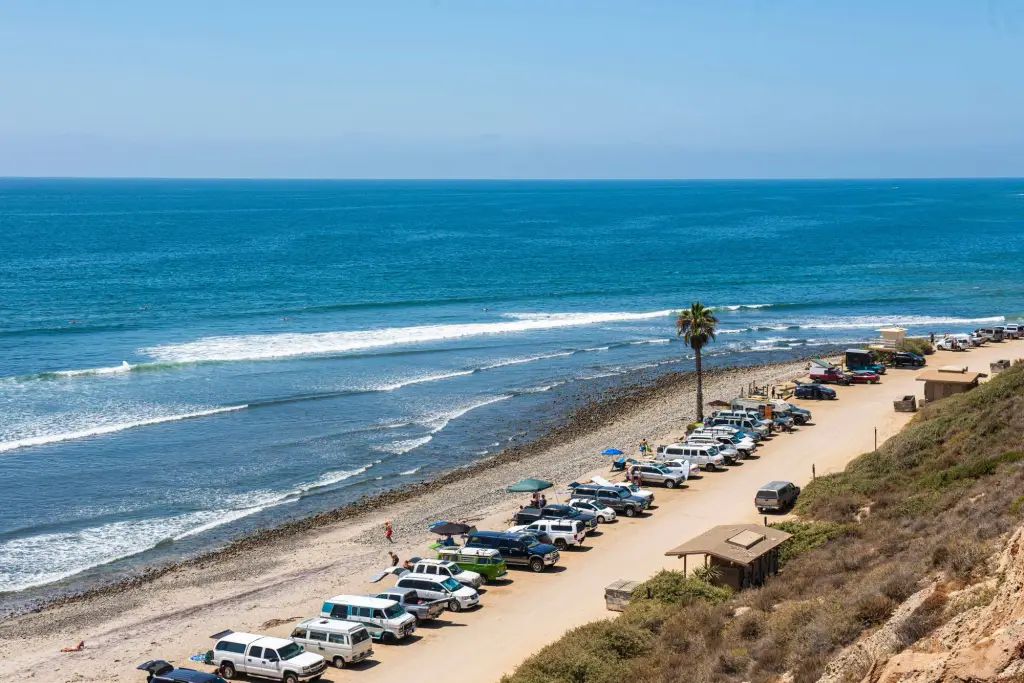
- Swell & Wind: Swells mainly from the northwest, with moderate onshore winds during summer.
- Water Temperature: Varies depending on season, averaging around 65°F (18°C) in winter and 72°F (22°C) in summer.
- Air Temperature: Enjoy warm, sunny weather most of the year, with an average high of 70°F (21°C).
- Wave Size: Depending on location, Old Man’s offers gentle rollers perfect for beginners (2-4 feet). Lower Trestles boast challenging waves for experienced surfers (6-10 feet).
- Crowd Levels: Expect moderate crowds year-round, especially on weekends and during summer.
- Best Season: Spring and fall offer the most consistent waves and comfortable temperatures, while winter creates larger surf.
- Skills: All levels welcome! Old Man’s is often dubbed the best surfing in California for beginners, with its mellow waves and sandy bottom.
5. Baleal Beach, Peniche, Portugal
For those seeking surfing in Portugal for beginners, look no further than Baleal Beach, nestled on the Peniche peninsula. This golden arc of sand offers consistent waves, gentle learning curves, and a vibrant surf community, making it a top contender for best surfing in Portugal for beginners.
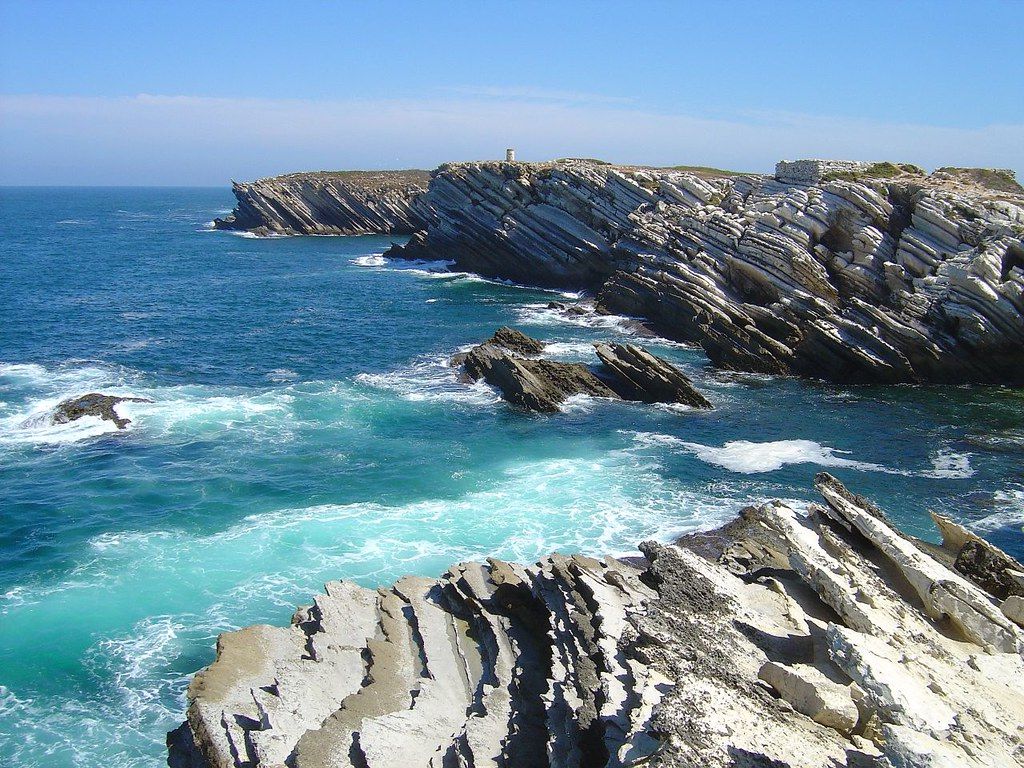
- Swell & Wind: Consistent swells, offshore north winds (prevailing)
- Water Temperature: 14-17°C (57-63°F) in winter, 18-22°C (64-72°F) in summer
- Air Temperature: 13-18°C (55-64°F) in winter, 21-27°C (70-81°F) in summer
- Average Wave Size: 1-2 meters (3-6 feet)
- Crowd Levels: Moderate, can be higher in peak season (summer)
- Best Season to Surf: Spring (April-May), Summer (June-August), Autumn (September-October)
- Skills: Perfect for surfing in Portugal for beginners and intermediate surfers. Surf schools and beginner-friendly wave sections are readily available.
With its consistent swells, gentle waves, and abundant surf schools, Baleal Beach earns its place among the best beginner surf spots.
6. Tamarindo Beach, Costa Rica
Tamarindo Beach in Costa Rica stands as a timeless favorite for those seeking the perfect introduction to the world of surfing. Boasting consistent waves, gentle slopes, and a vibrant surf community, it’s no surprise Tamarindo is often dubbed the best surfing in Costa Rica for beginners.
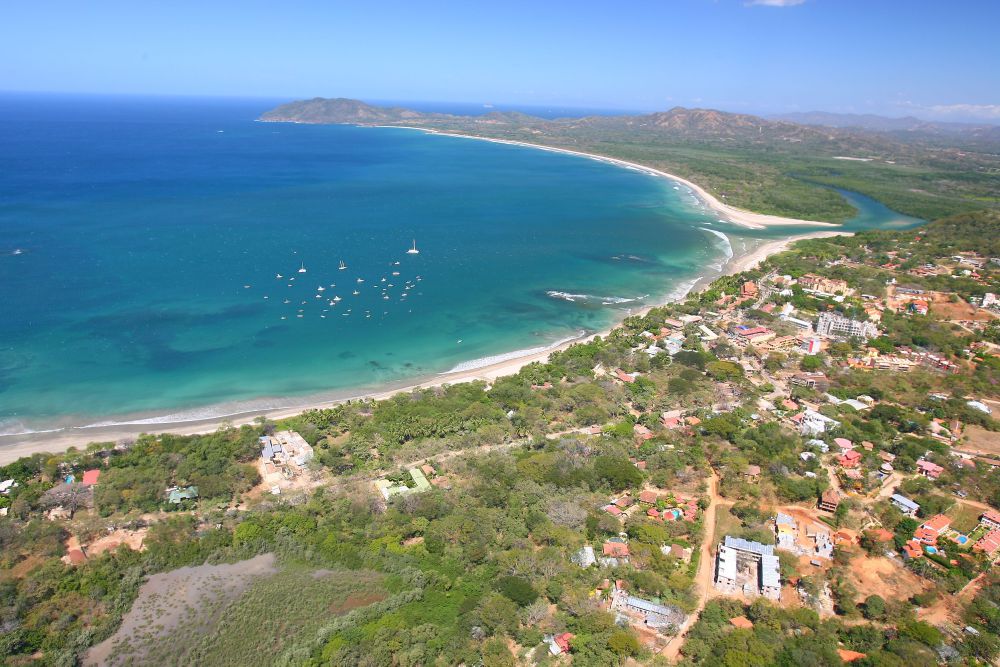
- Water Type: Pacific Ocean, warm and clear.
- Swell & Wind: Consistent swells during the dry season (December-April), offshore winds most mornings.
- Water Temperature: Average 80°F (27°C) year-round.
- Air Temperature: Warm and humid, ranging from 75-85°F (24-29°C).
- Average Wave Size: Gentle and rolling, typically waist-high or smaller.
- Crowd Levels: Moderate, especially during peak season (December-April).
- Best Season: Dry season (November-May) for calmer waves and consistent swells.
- Skills Needed: No prior experience necessary; lessons readily available.
Whether you’re a complete novice or looking to improve your skills, surfing in Costa Rica for beginners starts at Tamarindo. Gentle waves, experienced instructors, and a supportive atmosphere make it the ideal launchpad for your surfing journey.
7. Luquillo Beach, Puerto Rico
Luquillo Beach, nestled on the northeastern coast of Puerto Rico, offers a welcoming embrace for those seeking their first taste of surfing in Puerto Rico for beginners. As one of the best places to surf for beginners on the island, its gentle waves and relaxed vibe create the perfect environment to learn the ropes.
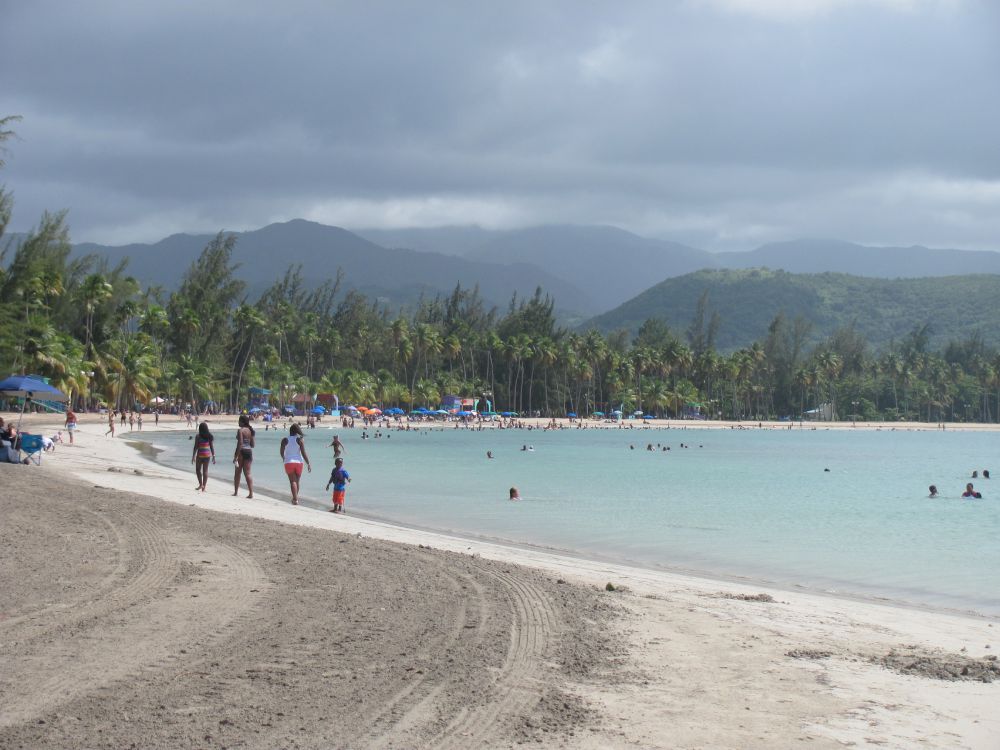
- Water Type: Protected bay with calm, gentle waves.
- Swell & Wind: Consistent north and northeast swell with offshore winds.
- Water Temperature: Warm, averaging 78°F (26°C) year-round.
- Air Temperature: Tropical, averaging 85°F (29°C).
- Wave Size: 2-4 ft (0.6-1.2 m) on average, ideal for learning.
- Crowd Levels: Moderate, with more activity on weekends and holidays.
- Best Season to Surf: Year-round, but avoid hurricane season (June-November).
- Skills: Beginner-friendly, but lessons are recommended for first-timers.
With many surf schools and board rentals available, Luquillo Beach provides a safe and enjoyable environment to progress.
8. Cocoa Beach, Florida
Sun-kissed beaches, consistent waves, and a vibrant surfing community make Cocoa Beach, Florida, a haven for those seeking their first taste of riding the waves. Renowned as the best surfing in USA for beginners, Cocoa Beach offers a perfect blend of manageable swells, warm water, and a supportive atmosphere, making it an ideal launchpad for your surfing journey.
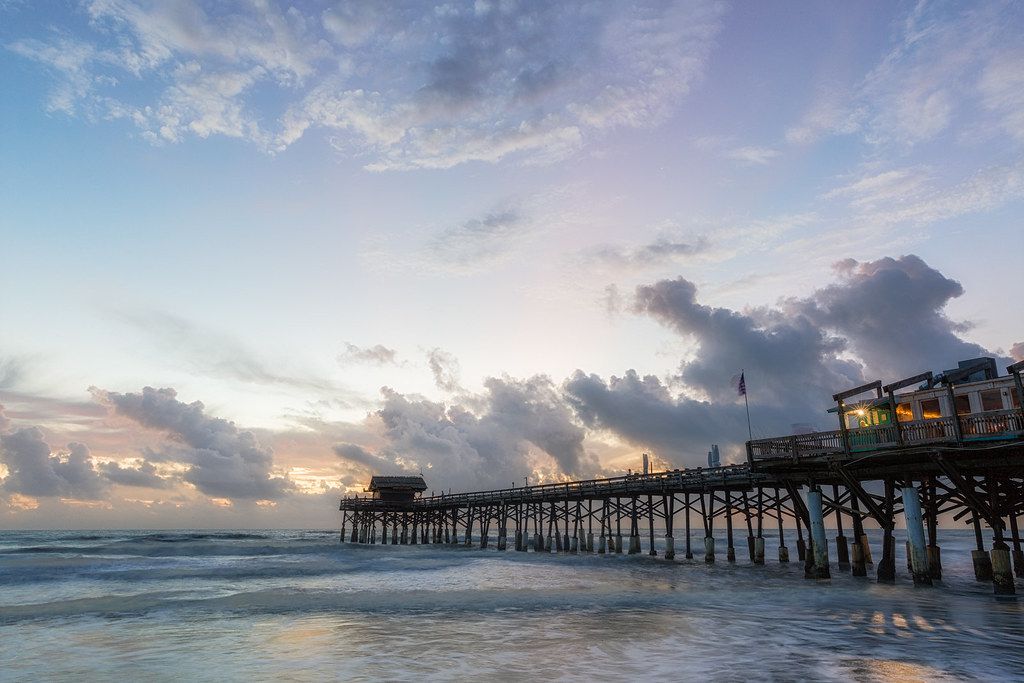
- Water Type: The Atlantic Ocean provides warm temperatures year-round, making wetsuits optional except in winter. Waves are primarily beach breaks, meaning they roll directly onto the shore without the influence of reefs or other structures.
- Swell & Wind: Primarily picks up northeasterly swells, with light offshore winds being ideal.
- Water Temperature: Warm year-round, averaging 72°F (22°C).
- Air Temperature: Pleasant all year, ranging from 70°F-85°F (21°C-29°C).
- Average Wave Size: Gentle, mostly knee-to-waist high, with occasional chest-high sets.
- Crowd Levels: Varies depending on season and time of day. Weekends and holidays tend to be busier.
- Best Season to Surf: Fall offers the most consistent swell, but spring and summer are good options.
- Skills: Perfect for beginners and those looking to improve their fundamentals.
Whether you’re drawn to surfing in Florida for beginners reputation or captivated by the allure of catching your first wave, Cocoa Beach provides the ideal setting. With its inviting atmosphere, consistent surf, and abundance of surf schools and rentals, Cocoa Beach is poised to be the launchpad for your unforgettable surfing adventure.
9. La Jolla Shores, San Diego
With a sun-kissed California coastline, gentle waves rolling in, and the thrill of riding your first wave, La Jolla Shores in San Diego offers a perfect introduction to surfing. Let’s dive into the key aspects to know before you hit the water:
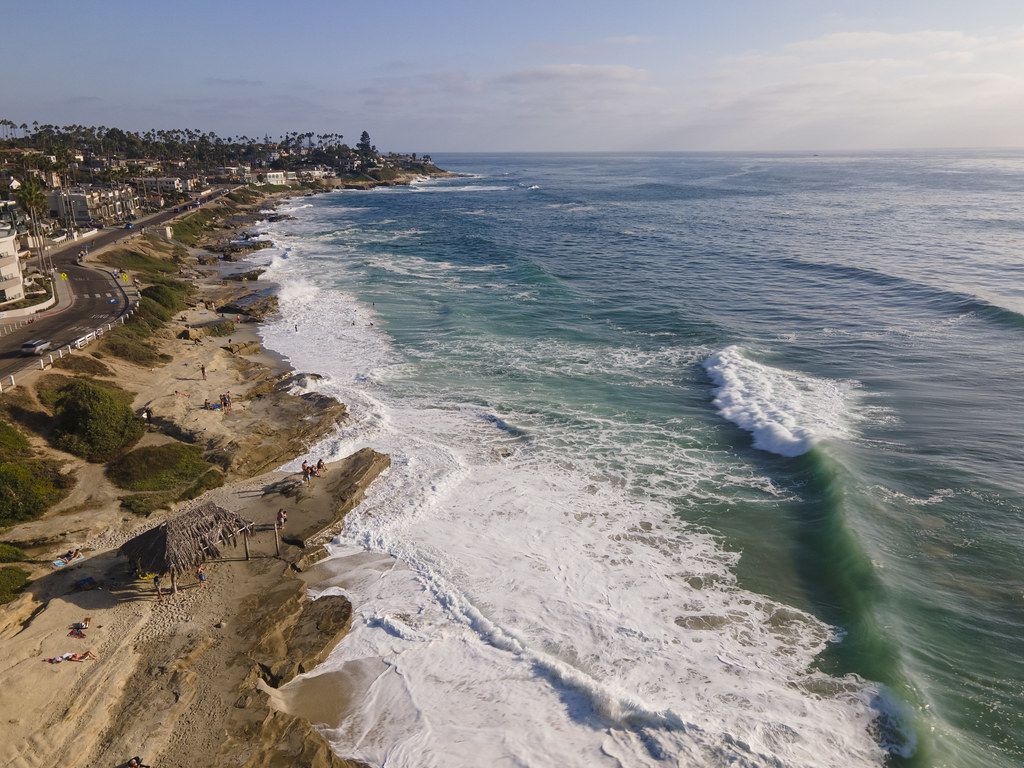
- Water Type: Gentle beach break with consistent rolling waves.
- Swell and Wind: Ideal with westerly swells and offshore easterly winds. Avoid onshore winds that can make waves choppy.
- Water Temperature: The average year-round temperature is around 60°F (16°C), so wetsuits are recommended year-round.
- Air Temperature: Warm throughout the year, with summer averaging 75°F (24°C) and winter around 60°F (16°C).
- Average Wave Size: Small to medium waves, ideal for beginners, ranging from 2-4 feet (0.6-1.2 meters) most of the year.
- Crowd Levels: It can get crowded, especially on weekends and during summer. Aim for weekdays or early mornings for a less crowded experience.
- Best Season to Surf: Winter (November to March) offers the most consistent swell, but spring and fall are good options.
- Skills: While beginner-friendly, basic swimming skills, ocean awareness, and surf etiquette are crucial. Consider taking a lesson from one of the many surf schools located at the beach.
With its sheltered location and consistent waves, La Jolla Shores regularly ranks among the best surf spots in San Diego for beginners and the best beginner surf spots nationwide.
10. Waikiki Beach, Oahu, Hawaii
Waikiki Beach on Oahu, Hawaii, embodies the quintessential surfer’s dream. Gentle waves lap against golden sand, framed by lush greenery and the iconic Diamond Head crater. But beyond the postcard image lies a vibrant surfing scene, welcoming seasoned riders and eager newcomers. Let’s delve into the practicalities of catching waves at this legendary beach.
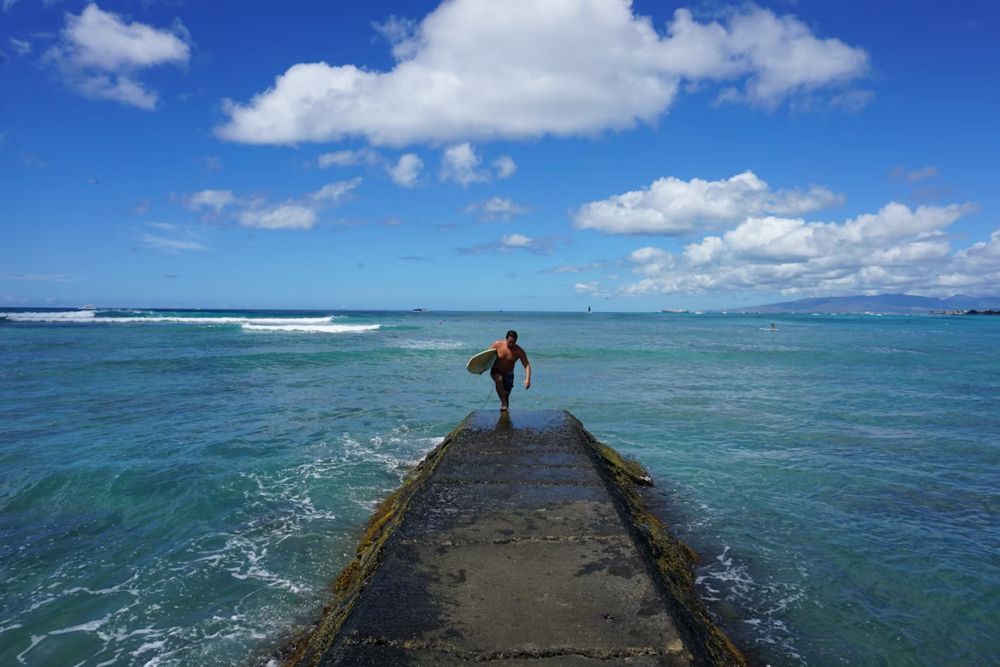
- Water Type: Protected by Diamond Head Crater, Waikiki boasts calm, gentle waves ideal for learning.
- Swell and Wind: Expect consistent south-westerly swells and trade winds, creating predictable waves.
- Water Temperature: Year-round warmth (75-80°F) makes wetsuits optional.
- Air Temperature: Sunshine reigns, with average highs in the mid-80s°F.
- Average Wave Size: Beginner-friendly, averaging 2-4 feet, with occasional larger swells.
- Crowd Levels: Expect moderate crowds, especially during peak season (summer).
- Best Season to Surf: Summer (May-November) offers calmer waters. At the same time, winter (December-April) brings larger waves for more experienced surfers.
- Skills: Beginners can take lessons at the best beginner surf spots in Oahu, like Queen’s Surf and Canoes. Experienced surfers can challenge themselves at the best surf spots in Oahu for beginners, like Publics and Kewalo Beach.
By following safety guidelines and respecting the ocean, you will surely experience the thrill of riding the waves at Waikiki Beach, a timeless emblem of Hawaiian surf culture.
11. Hanalei Bay, Kauai, Hawaii
Hanalei Bay, nestled on the North Shore of Kauai, Hawaii, entices surfers of all levels with its idyllic setting and consistent waves. But is it truly the “best surfing in Kauai for beginners,” and how does it stack up to “best beginner surf spots” in general? Let’s dive into the key aspects to consider:
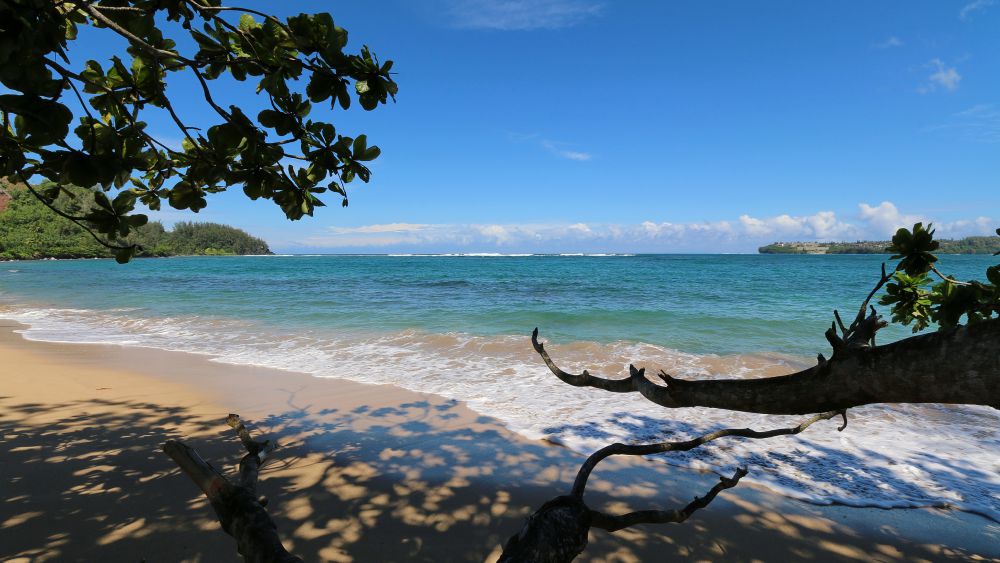
- Water Type: Protected reef break, offering gentle, rolling waves ideal for learning.
- Swell & Wind: Consistent winter swells (Nov-Feb) with light offshore winds for smooth rides. Summer offers smaller waves and onshore winds, which are better for intermediate practice.
- Water Temperature: Warm year-round, averaging 75-80°F (24-27°C).
- Air Temperature: Tropical climate with highs in the mid-80s°F (29-32°C) year-round.
- Average Wave Size: 2-4 feet (0.6-1.2m) in winter, perfect for beginners. Summer offers smaller, mellow waves.
- Crowd Levels: Moderate in winter, increasing with swell size. It is less crowded in summer, but the waves are smaller.
- Best Season: Winter (Nov-Feb) for consistent waves and ideal learning conditions. Summer (May-Aug) offers smaller, less crowded waves for intermediate practice.
- Skills: Beginner-friendly, but lessons are highly recommended for safety and technique guidance. Many surf schools offer beginner-specific programs, making Hanalei Bay a top contender for best surfing in Kauai for beginners. It’s often considered one of the best spots for surfing in Hawaii for beginners overall.
Remember, respecting the local community and ocean safety are paramount. Always heed lifeguards’ instructions and follow surfing etiquette to ensure a memorable experience.
12. Sayulita, Mexico
Sayulita, Mexico, isn’t just a beach town; it’s a surfer’s paradise, particularly for those taking their first steps on the board. With consistent waves, friendly locals, and a vibrant atmosphere, Sayulita earns its title as the best surfing in Mexico for beginners or one of the best surf spots for beginners.
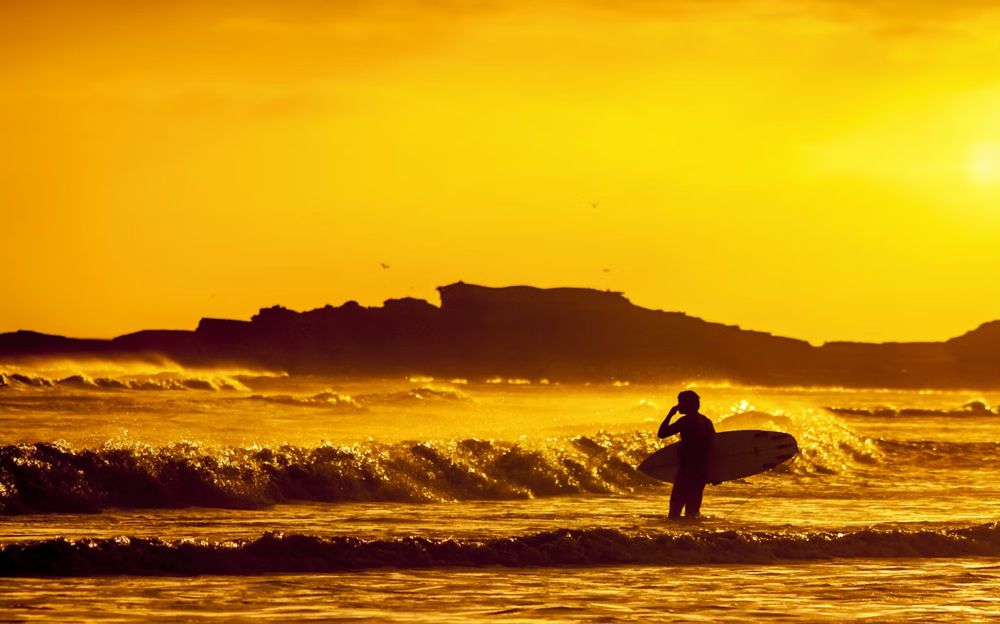
- Water Type: The warm Pacific Ocean is ideal for comfortable swims and board paddling.
- Swell & Wind: Consistent right-hand breaks year-round, with stronger swells in winter (December – April) and light offshore winds throughout the year.
- Water Temperature: Ranges from 22°C (72°F) in winter to 27°C (81°F) in summer, perfect for wetsuits or boardshorts.
- Air Temperature: Warm to hot year-round, averaging 28°C (82°F). Pack sunscreen and breathable clothing.
- Average Wave Size: Sayulita’s waves are generally 1-2 meters (3-6 feet), ideal for beginners and intermediates. More advanced breaks are nearby.
- Crowd Levels: Expect moderate to high crowds, especially in the main break. Consider early mornings or off-season visits for less congestion.
- Best Season to Surf: Winter offers larger swells, while spring and summer provide calmer conditions. Opt for shoulder seasons (May-June or September-October) to balance waves and crowds.
- Skills: Perfect for beginners and intermediates. More experienced surfers can explore nearby advanced breaks.
Ready to catch your first wave in Sayulita? This surfer’s haven awaits with open arms and endless possibilities.
How to Catch More Waves?
Catching waves can be a beginner’s nemesis, even in the best surfing places for beginners, but fear not! Here’s how to maximize your wave count:
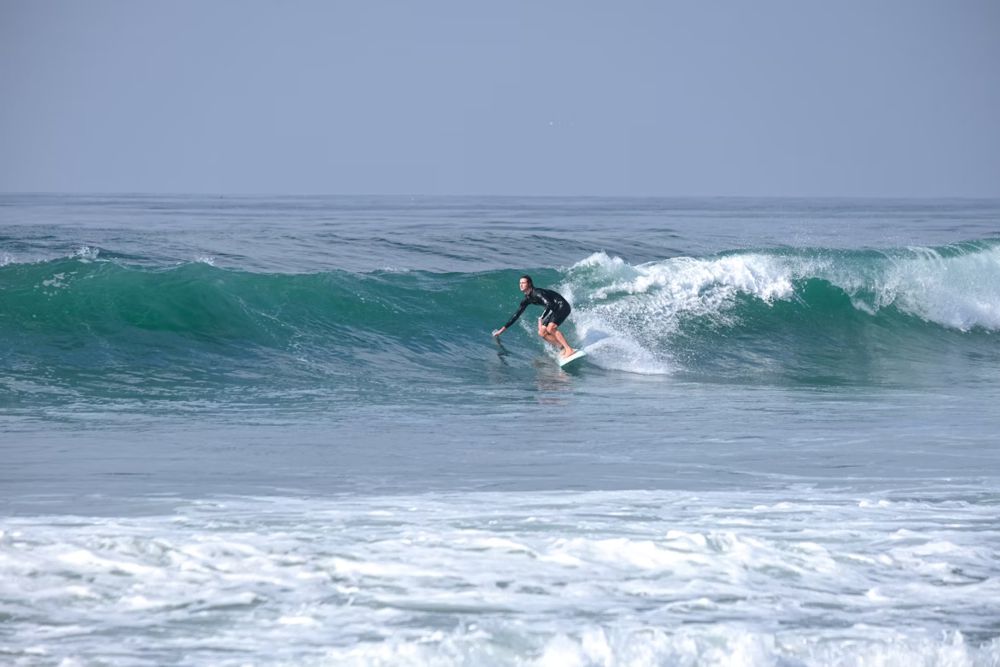
- Read the Waves: Learn where and how waves break. Identify the “peak” – the prime catching spot.
- Position Yourself: Paddle beyond the break, stay mobile, and use diagonal paddling to keep an eye on the wave.
- Paddle Power: Focus on smooth, powerful strokes for efficient wave catching. Consider building upper body strength.
- Lineup Etiquette: Respect the pecking order, communicate with others, and avoid “snaking” waves.
- Master the Paddle: Efficient paddling is the foundation for wave catching. Focus on proper technique, utilizing strong torso rotation and powerful arm strokes. Consider incorporating an electric fin from Boost Fin to amplify your paddling prowess and reach coveted waves before others.
- Start Beginner-Friendly: Choose gentle beach breaks with consistent waves for a safe and confidence-building experience.
With these tips and maybe a little electric help from Boost Fin, you’ll ride waves like a pro in no time!
Surfing with Boost Fin
Carving through turquoise waves, the thrill of the perfect ride is amplified – that’s the magic of Boost Surfing. This innovative electric fin propels your surfboard or paddleboard, letting you catch more waves, explore further, and enjoy longer sessions. But before you chase that ocean dream, ensure you get the genuine product.
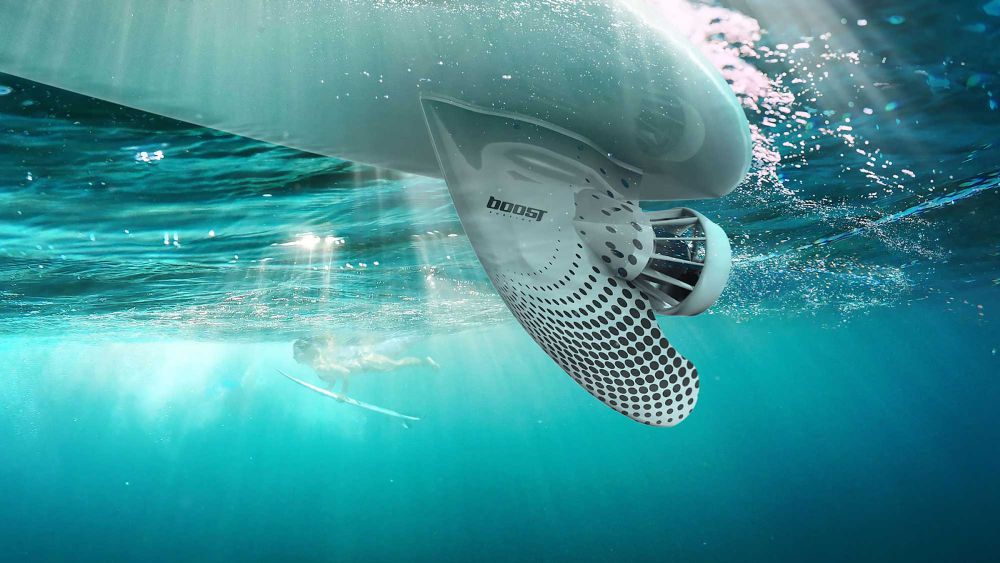
Boost Fin is only available through the official Boost Surfing store and select authorized distributors. While imitations might tempt with lower prices, they often need more quality, safety features, and performance than the original. Trusting the official channels guarantees a product that lives up to the hype and is backed by reliable customer service and warranty.
With proper preparation and a genuine Boost Fin propelling you forward, you’ll quickly navigate those best beginner surf spots. Just ensure your fin comes from the right source – the ocean awaits!


Share:
Best 5 Paddle Board Trolling Motor 2024
12 Best Places to Surf in April